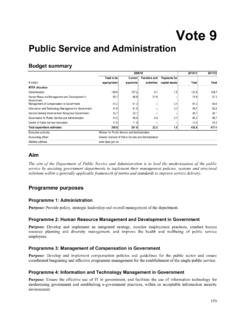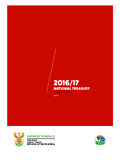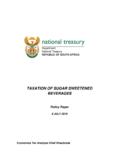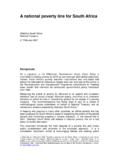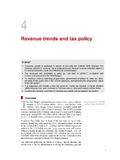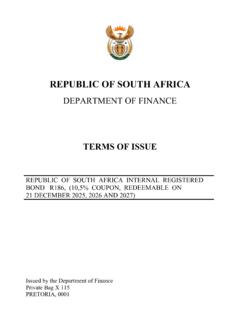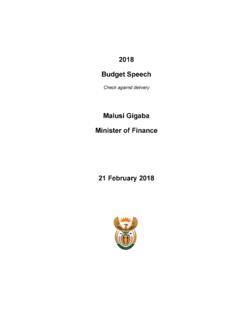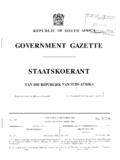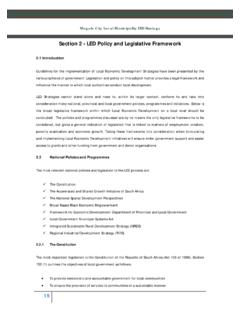Transcription of Chapter 6 - Financial management and MFMA …
1 616 Financial management and mfma implementation Introduction A consolidated legal framework for democratic, accountable and developmental local government is formed by the Municipal Finance management Act ( mfma ), together with the Municipal Structures Act, Municipal Systems Act, Municipal Property Rates Act and other local government legislation. The implementation of the mfma began in July 2004, and there is growing awareness of its significance throughout government . A phasing-in strategy allowed municipalities adequate time to implement the reforms required by the Act, and progress reported to date is encouraging. The mfma assigns clear roles and responsibilities to the various role-players involved in municipal Financial management , and sets out to achieve and maintain public accountability, transparency, good governance and Financial sustainability.
2 It is a powerful tool that sets the framework for municipal Financial reforms. The mfma is based on five principles: Promoting sound Financial governance by clarifying the roles and responsibilities of council and officials Ensuring a strategic approach to budgeting Modernising Financial management Promoting cooperative and consultative governance Promoting sustainable local government . Adherence to these principles will lay a basis for accelerated service delivery. A legal framework for democratic and accountable local government mfma assigns clear roles and responsibilities local government Budgets and Expenditure Review: 2001/02 2007/08 62 What makes the mfma special? local government is the community level of government . Integrated Development Plans (IDPs) incorporate community objectives into the day-to-day activities of municipalities and, together with other community participation processes, set the scene for the practical involvement of the community in local government affairs.
3 This ensures that municipal expenditure and activities are directed according to community needs. To deliver on identified community priorities it is important that the budget and IDP be linked to give effect to the plans. The mfma provides clear guidelines to municipalities on linking IDPs to budget processes. It also requires community consultation with regard to the performance of officials and political office-bearers, supply chain management , incurring of long-term borrowing, establishing municipal entities and a range of other issues. Furthermore, it creates a framework for the resolution of Financial disputes. The mfma s significant Financial and fiscal reforms include new budget standards and formats, the establishment of audit committees and internal controls, improvements to procurement and supply chain management processes, performance measurement and reporting, mechanisms to resolve Financial problems and procedures to determine and manage misconduct.
4 To step up implementation and compliance with the mfma , the focus over the past two years has been to build Financial management capacity within municipalities, raise awareness and establish monitoring structures. Although the mfma is being progressively phased in, according to local capacity, municipalities are required to ensure that the spirit of the Financial reforms is observed. In recognition of the vast differences in municipal capacity to embrace these Financial reforms, the National Treasury has prioritised certain areas for the initial implementation of the mfma . Table shows municipal capacity levels, by province. Municipalities with lower capacity are allowed more time to implement the mfma than municipalities with higher capacity. Support for implementation of the mfma is provided through: The Financial management grant, which was introduced in 2000/01 to provide Financial support to municipalities.
5 A programme for the employment and development of finance interns. Issuance of mfma circulars and guidelines. Provision of a help line for questions about the mfma and implementation issues, as well as a summary of frequently-asked questions and responses. Publication of mfma pocket guides and a guide for councillors. Integrated Development Plans incorporate community objectives Clear guidelines link IDPs to budget processes A focus on building Financial management capacity National Treasury provides support for implementing mfma Chapter 6: Financial management and mfma implementation 63 Posting of supporting materials on the National Treasury website. Provision of technical assistance in the form of international experts to support implementation in selected municipalities. Additional support through provincial treasuries. Table Municipalities by capacity per province.
6 2004 ProvinceNumberHighMediumLowEastern Cape 45 6 16 23 Free State 25 5 10 10 Gauteng 14 6 7 1 KwaZulu-Natal 61 9 16 36 Limpopo 30 3 8 19 Mpumalanga 21 6 6 9 Northern Cape 32 1 18 13 North West 25 6 8 11 Western Cape 30 8 18 4 Total 283 municipality disestablished : local government database, NT implementation of priority areas Municipalities and municipal entities are required to comply with all provisions of the mfma as they progressively come into effect.
7 The implementation of priority areas ensures that basic structures and processes are put in place along with planning that will provide the foundation for implementation . Municipalities are required to report on progress to the National Treasury quarterly. Summaries of progress in these priority areas are provided in this Chapter . Municipalities are encouraged to adopt a project management approach to implementation . This includes an implementation plan, the appointment of project managers, a steering committee and allocation of appropriate resources. Figure indicates the percentage of municipalities that have submitted the 2004/05 mfma implementation plan and any updates as at 30 April 2006. Figure mfma implementation plans received as of April 2006 Source: National Treasury survey Act is being implemented progressively in municipalities 9810 010 08910 010 010 010 010 0506070809010 0 EasternCapeFree StateGautengKwaZulu-NatalLimpopoMpumalan gaNorthernCapeNorth WestWesternCape% local government Budgets and Expenditure Review: 2001/02 2007/08 64 The mfma requires that an accounting officer and top management team (comprising the chief Financial officer and other senior managers responsible for votes) be appointed and that appropriate responsibilities are defined in a system of delegations.
8 Ninety per cent of municipalities that responded to a survey in November 2005 had an accounting officer and a top management team in place. Seventy-three per cent reported that a system of delegations and performance reviews had been implemented. Almost all municipalities reported implementing proper internal controls and cash management systems, and between 85 per cent and 95 per cent of municipalities were able to meet all Financial obligations to creditors within the 30-day time period prescribed. Improvements in budgeting Reforms cover the full cycle of budgets from planning to implementation One of the key components of the Financial reforms is budgeting. Reforms in this area cover the whole budgets-cycle, from planning and approval through to implementing budget plans and annual reporting.
9 The first objective is to achieve quality and credible multi-year budgets. Many municipalities shows improvement in the following elements of budgeting: Multi-year budgets for capital and operating budgets Tabling and approving budgets within the prescribed timetable Integrating IDPs with budgets Service Delivery and Budget implementation Plans Consultations with communities, national and provincial government Budget documentation of improved content and quality. Slow progress with tabling and approval dates Although the legislated tabling and approval dates for budgets for all municipalities applied for the first time to the 2005 budgets, progress has been slow, as illustrated in Figure This figure shows the percentage of municipalities that tabled (for consultation) and adopted their budgets in time. Section 16(2) of the mfma requires mayors to table the annual budget in council at least 90 days before the start of the budget year, by March 31 each year.
10 Nearly all municipalities report implementing proper internal controls Chapter 6: Financial management and mfma implementation 65 Figure Budgets tabled and adopted, 2005/06 Source: National Treasury survey Municipal councils must consider approval of their annual budgets at least 30 days before the start of the budget year. Seven municipalities failed to approve a budget prior to the start of the 2005/06 Financial year. Such non-compliance could have significant implications for service delivery and, in some cases, may lead to provincial intervention. Although 153 municipalities did not table their budgets by 31 March 2005, only seven municipalities failed to meet the deadline of 30 June 2005. In 277 municipalities in five provinces there was 100 per cent compliance in approving budgets by the deadline.
